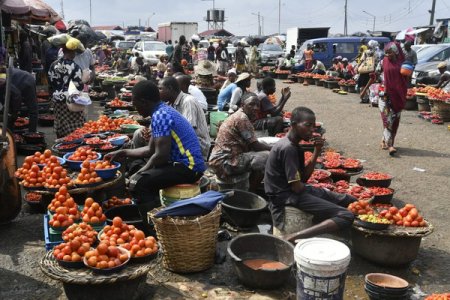
In June 2024, Nigeria saw a surge in food prices with headline inflation reaching 34.19%. Essential items like beans, tomatoes, and yam saw dramatic increases, prompting the government to introduce a 150-day duty-free import window for key foodstuffs to stabilize prices and enhance food security.
In June 2024, Nigeria faced a sharp increase in food prices, with headline inflation rising to 34.19%, up from 33.95% in May. The National Bureau of Statistics (NBS) reported significant year-on-year price hikes for essential food items. For instance, the cost of 1kg of brown beans soared by 252.13% to ₦2,292.76, compared to ₦651.12 in June 2023. Tomatoes experienced a 320.67% increase, reaching ₦2,302.26 per kg, up from ₦547.28 last year.
Other staples also saw dramatic price increases. Irish potatoes surged by 288.50% to ₦2,423.27 per kg, while white Garri went up by 181.66% to ₦1,135.51. Yam tubers experienced a 295.79% rise, now costing ₦2,021.55 per kg. Regional disparities were evident, with Kogi reporting the highest prices for brown beans at ₦3,006.43 and Abuja seeing the highest costs for tomatoes at ₦3,992.61. Lagos had the highest average price for yam at ₦3,376.54.
To address these rising costs, the Nigerian government has introduced a 150-day duty-free import window for essential food items such as maize, wheat, and cowpeas. This measure aims to ease food price pressures and ensure better food security. The government has also approved the nationwide distribution of certain grains to mitigate the impact of rising food costs.





